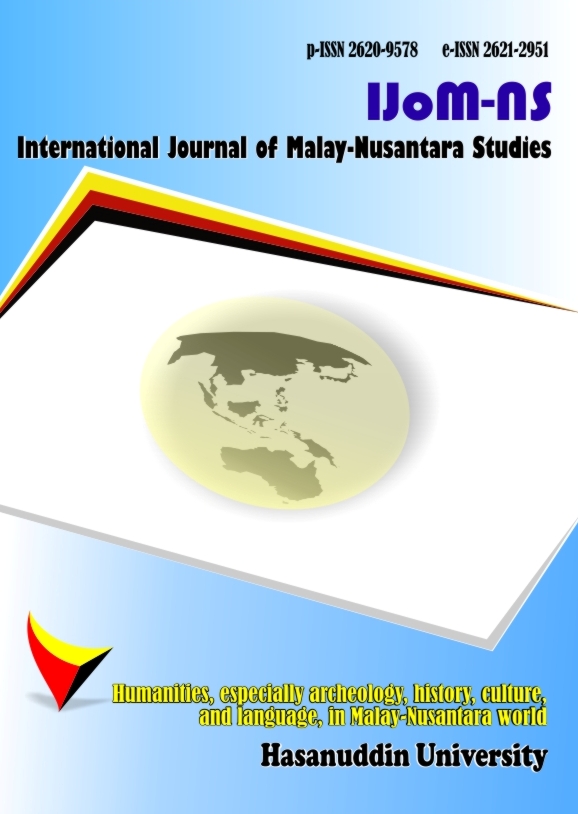PROTECTING NATIONAL IDENTITY BASED ON THE VALUE OF NATION LOCAL WISDOM
Keywords:
Conflict, Culture, National Integrity, Local Wisdom, Hate Industry.Abstract
The national scale of national unity is a noble idea that will ultimately lead to peace. Contemplating the recent social reality, it seems that the willingness to build peace needs more serious consistency. This is constituted on social phenomena that are born massively and at once tends to undermine national unity. The emergence of horizontal conflicts that bring out SARA issue managed to threaten peace. Interestingly, this phenomenon often appears ahead of the political contestation. Therefore, to guarantee a healthy democratic system and support national integration. Therefore, through the values of local wisdom is expected to reduce the problems above. This paper aims to explain the cause of the fertile of negative issues and to examine more deeply related to the values of local wisdom. The method of writing used is literature analysis. The results of the analysis found that behind the proliferation of the SARA issue that triggers social conflict is a phenomenon built by political entrepreneurs to support personal interests. This is marked by the time when the issue arose when the political year was approaching. Thus, social conflict is not a natural product of communal society, but a product of deliberate political strategy. It is concluded that reconstructing the value of local wisdom becomes the most concrete solution in overcoming the problems related to national unity and coalescence.References
Abburachman. (2003). Potensi dan Peran Kearifan Lokal Nusantara dalam Pembangunan Kebudayaan Indonesia. Jurnal Budaya. 7 (8).
Anderson, B. (2006). Imagined Communities. New York: Verso.
Aning, F. (2015). Filsafat Pancasila Menurut Bung Karno. Yogyakarta: Media Pressindo
Asmaroini, A., P. (2016). Implementasi Nilai-Nilai Pancasila Bagi Siswa di Era Globalisasi. CITIZENSHIP: Jurnal Pancasila dan Kewarganegaraan. 4 (2).
Atmodjo, M., M., S., K. (1986). Pengertian Kearifan Lokal dan Relevansinya dalam Modernisasi dalam Ayatrohaedi penyunting. Kepribadian Budaya Bangsa (Local Genius). Jakarta: Dunia Pustaka Jaya.
Baudrillard, J. (1994). The Precession of Simulacra: In Simulacra and Simulation, Ann Arbor: University of Michigan Press.
Bourdieu, P. (1998). On Television. Translated by Priscilla Parkhurst Ferguson. New York: The New Press.
Durham, M., G. and Kellner, D., M. (2006). Media and Cultural Studies. Australia: Blackwell Publishing Ltd.
Dyer, R. (1984). Stereotyping: In Gays and Film. Translated by Priscilla Parkhurst Ferguson. New York: Zoetrope.
George, C. (2017). Pelintiran Kebencian: Rekayasa Ketersinggungan Agama dan Ancamannya bagi Demokrasi. Translated by Tim PUSAD Paramadina dan IIS UGM. Jakarta: PUSAD Paramadina.
Giddens, A. (1990). The Concequences of Modernity. California: Standford University.
Hall, S. (1980). Encoding/decoding, in S. Hall, D. Hobson, A. Lowe and P. Willis (eds.), Culture, Media, Language, London: Hutchinson.
Haryanto, S. (2012). Konflik Sosial Di Era Reformasi, Masyarakat, Kebudayaan dan Politik. Fisip, Universitas Lampung, Lampung. 25 (4): 299–308.
Ismail, et.al. (2010). Revitalisasi Kearifan Lokal Dalam Mayarakat Multikultural. Semarang: Balai Penelitian dan Pengembangan Agama.
Iwan, B. (2010). Multimedia Digital Dasar dan Teori Pengembangannya. Yogyakarta: Penerbit ANDI
Kaelan and Zubaidi. (2007). Pendidikan Kewarganegaraan untuk Perguruan Tinggi. Yogyakarta: Paradigma.
Kahmad, D. (2011). Sosiologi Agama; Potret Agama dalam Dinamika Konflik, Pluralisme dan Modernitas. Bandung: Pustaka Setia.
Kholid, I. Begini Perjalanan Kasus Dugaan Penistaan Agama Oleh Ahok Di Bareskrim. Detik, 7 November 2016. https://Detik.com/news/berita/3338806/begini-perjalanan-kasus-dugaan-penistaan-agama-oleh-ahok-di-bareskrim.
Koentjaraningrat. (1987). Sejarah Teori Antropologi I. Jakarta: UI Press.
Koentjaraningrat. (2009). Pengantar Ilmu Antropologi. Jakarta: Rineka Cipta.
Margono. (2012). Landasan dan Tujuan Pendidikan Pancasila. Malang: Universitas Negeri Malang UM Press.
Naim, S. (1983). Kerukunan Antar Umat Beragama, Jakarta: Gunung Agung.
Najwan, J. (2009). Konflik Antar Budaya dan Antar Etnis di Indonesia Serta Alternatif Penyelesaiannya. Jurnal Hukum Edisi Khusus. 06: 195-208.
Nugroho, et. al. (1999). Politik Media Mengemas Berita. Yogyakarta: Institut Studi Arus Informasi (ISAI).
Nugroho, I. (2010). Jurnal Konstitusi Nilai-Nilai Pancasila Sebagai Falsafah Pandangan Hidup Bangsa Untuk Peningkatan Kualitas Sumber Daya Manusia Dan Pembangunan Lingkungan Hidup. Puskasi FH Universitas Widyagama Malang. 3 (2).
Priliantini, A and Damayanti. (2018) The Role of Social Media in Shaping Group of Solidarity in Aksi 411 and 212. Jurnal Komunikasi, Media dan Informatika. 7 (1).
Poerbakawatja, S. (1976). Ensiklopedia Pendidikan, Jakarta: Gunung Agung.
Ratna, N., K. (2009). Teori Sastra dari Strukturalisme Hingga Postrukturalisme Perspektif Wacana Naratif. Yogyakarta: Pustaka Pelajar.
Ratna, N., K. (2010). Metode Penelitian Kajian Budaya dan Ilmu Sosial Humaniora Pada Umumnya. Yogyakarta: Pustaka Pelajar.
Saksono, S. (2010). Marhaenisme Bung Karno: Marxisme ala Indonesia. Jakarta: Rumah Belajar Yabinkas.
Siregar, A. (2000). Media Pers dan Negara: Keluar dari Hegemoni. Jurnal Ilmu Sosial dan Ilmu Politik. 4 (2): 171-196.
Sofyan, S. (2003). Implementasi Nilai-Nilai Konstitusi dalam Meningkatkan Persatuan dan Kesatuan Bangsa. Jakarta: Lemhanas.
Sumarsono. (2001). Pendidikan Kewarganegaraan. Jakarta: PT. Gramadia Pustaka Utama.
Tholhah, I., et.al. (2001). Mewaspadai dan Mencegah Konflik antar Umat Beragama, Jakarta: Departemen Agama RI, Badan Litbang Agama dan Diklat Keagamaan, Proyek Peningkatan Kerukunan antar Umat Beragama.
Tim Penyusun. (1997). Ensiklopedi Nasional Indonesia. Jakarta: Delta Pamungkas.
Toer, P., A. (2006). Jejak Langkah. Jakarta: Lentera Dipantara.
Vunderkind. Furious Oyedepo Asks Church To Kill Anyone Who Looks Like an “Islamic Demon” Nigerian Bulletin, 4 Januari 2015, http://www.nigerianbulletin.com/threads/furious-oyedepo-asks-church-to-kill-anyone-who-looks-likean-islamic-demon.106001/.
Wilhelm, A., G. (2003). Demokrasi di Era Digital. Yogyakarta: Pustaka Pelajar.

